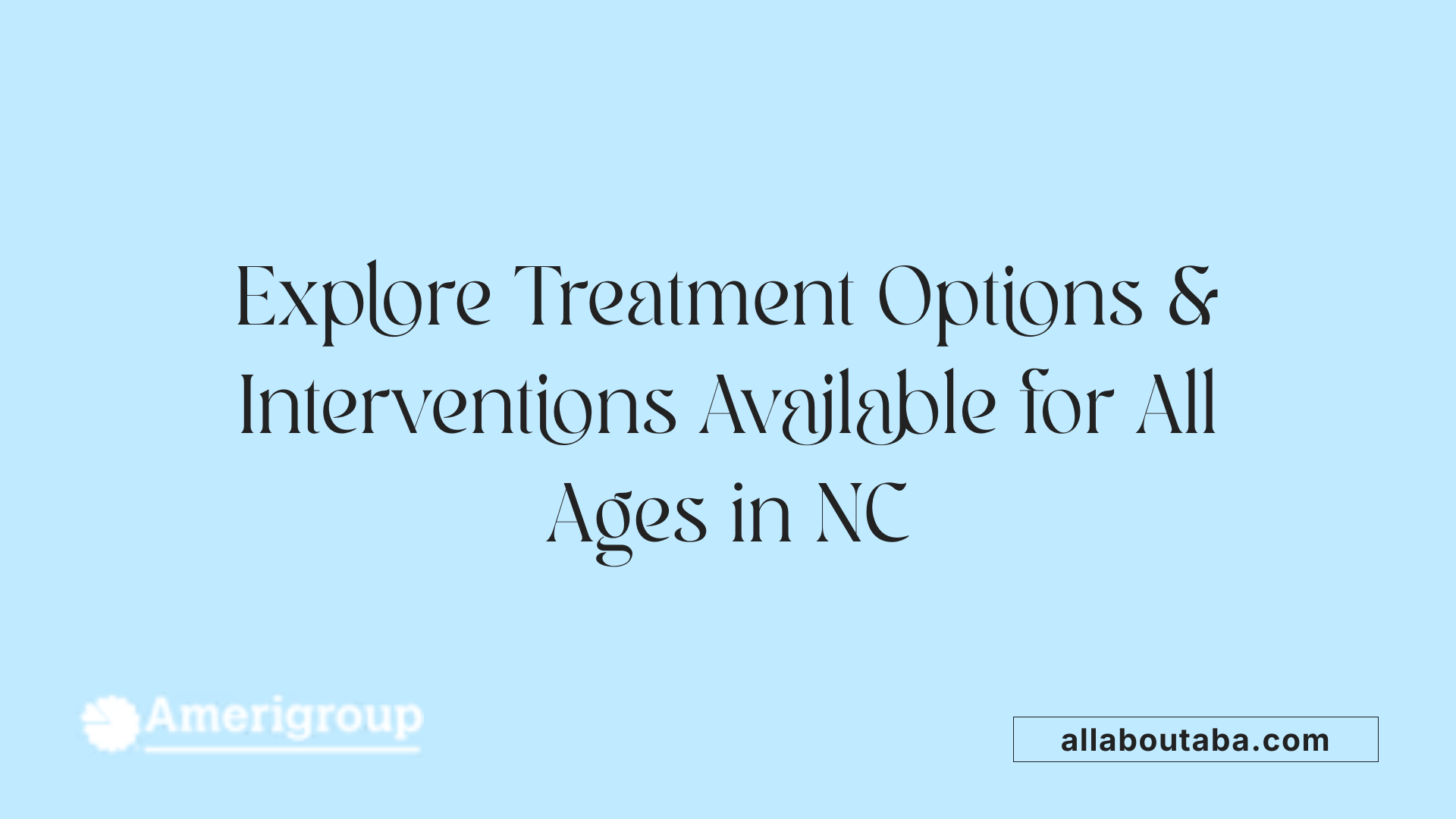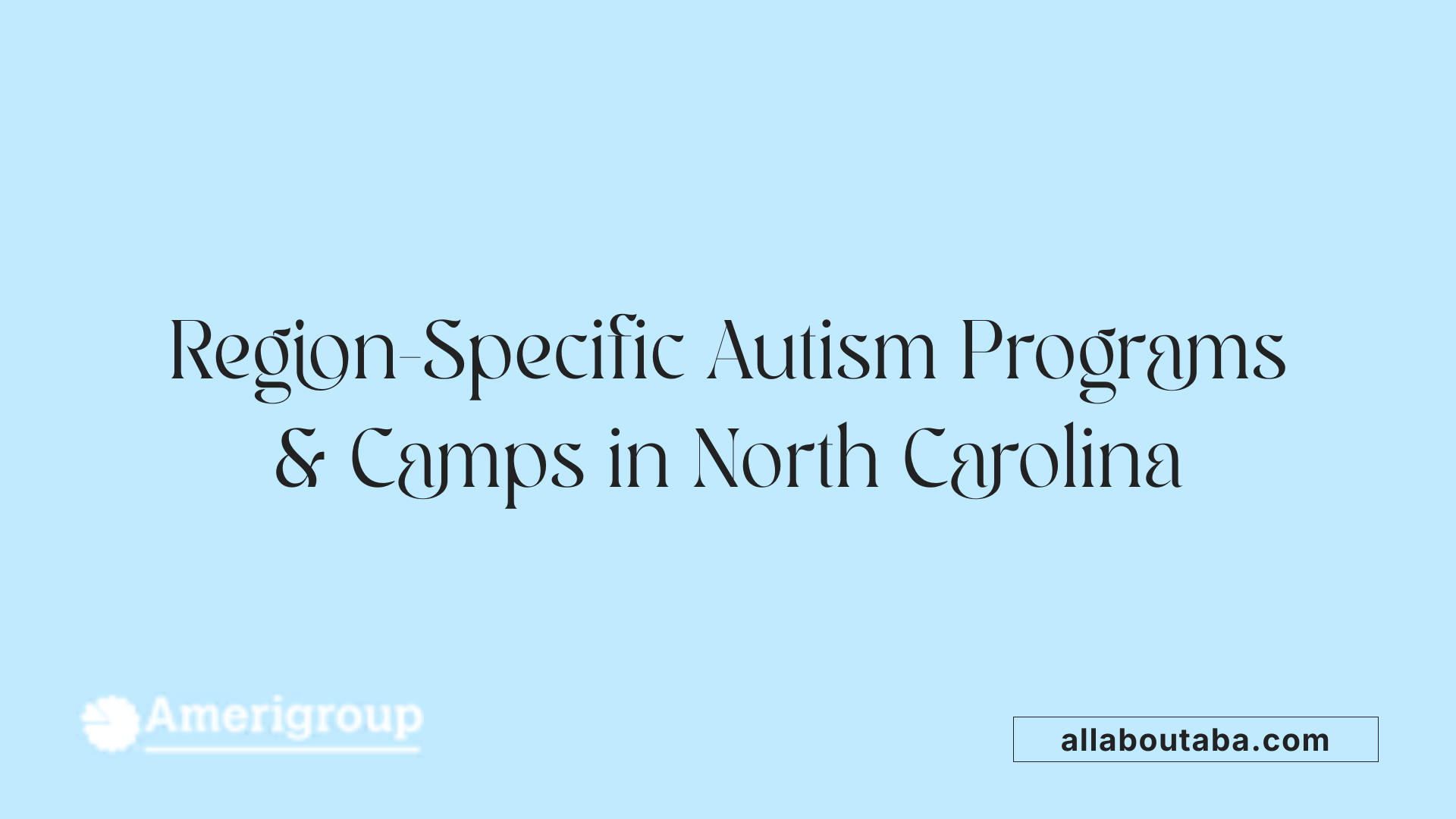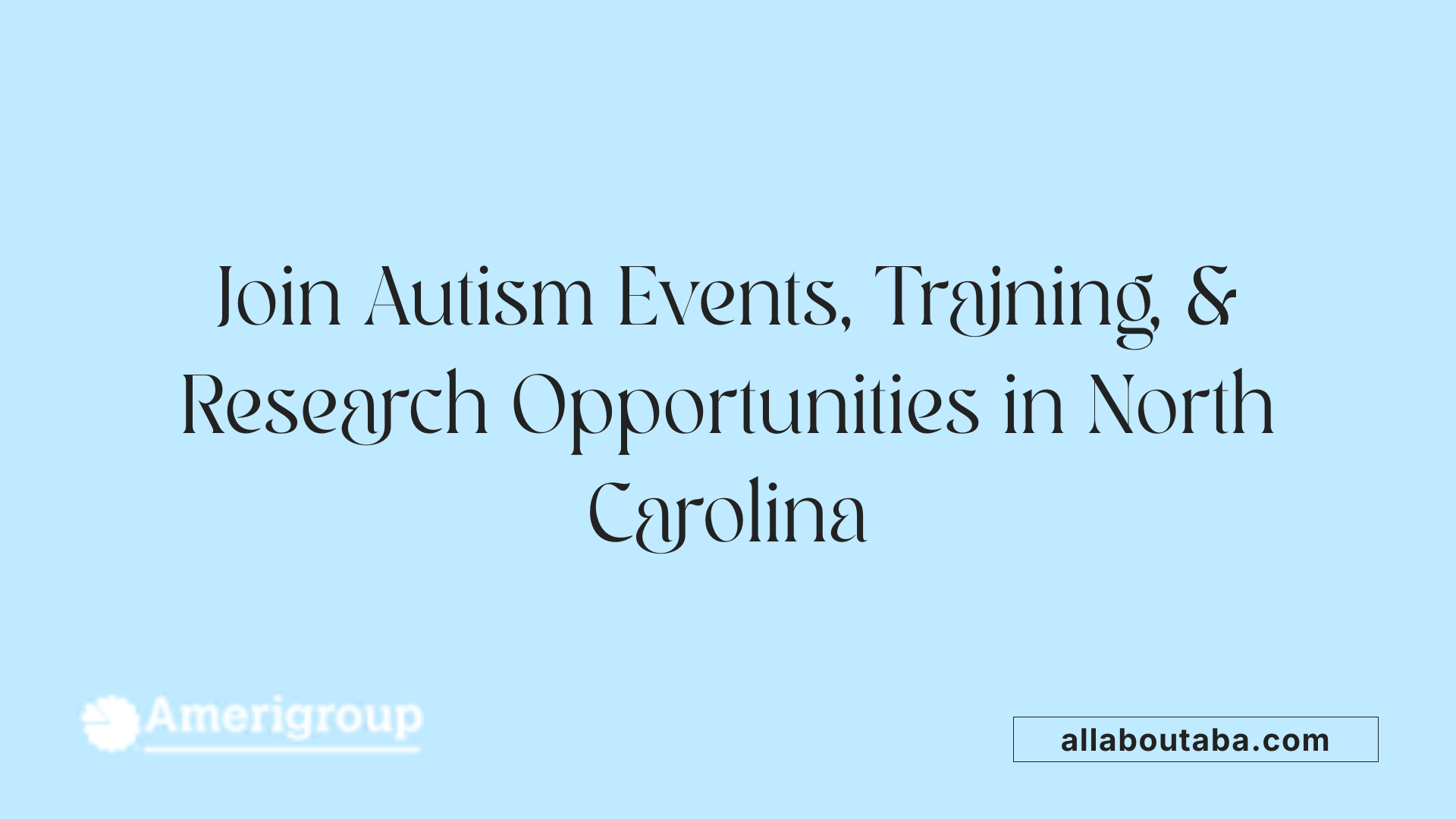Empowering Individuals and Families with Autism in North Carolina
North Carolina offers a diverse array of autism resources, programs, and services designed to support individuals across the lifespan. From early diagnosis and intervention to community support and advocacy, the state fosters an environment of inclusion, education, and tailored care. This guide explores the key organizations, treatment options, regional resources, educational tools, and opportunities for engagement available throughout North Carolina, aiming to give families, professionals, and individuals with autism easy access to vital information and support networks.
Main Autism Service Providers and Resources in North Carolina

What autism resources, programs, and services are available in North Carolina?
North Carolina offers a comprehensive network of autism resources, programs, and services designed to assist individuals with autism and their families. The Autism Society of North Carolina (ASNC) is a central organization providing community support, educational webinars, advocacy, and family assistance across the state. Their services include access to Autism Resource Specialists in every county, ensuring local support. The state also hosts specialized clinics like the ABA Clinic in Raleigh, which serves children ages seven and younger with an established autism diagnosis.
The TEACCH® Autism Program, based at UNC, offers diagnostic evaluations, family consultations, family support groups, employment services, and ongoing research activities. Similarly, organizations such as Camp Royall, recognized as the nation's oldest and largest camp for individuals with autism, offer summer, fall, and winter programs for children and adults.
Supporting educational and developmental needs, the UNC Carolina Institute for Developmental Disabilities provides clinical services and acts as a resource for at-risk populations. The NC Department of Health and Human Services (DHHS) and local agencies like the Children’s Developmental Service Agencies facilitate early assessment, intervention, and Medicaid-covered therapies.
In addition, there are online webinars and community events such as the Fall Run/Walk for Autism, which promote awareness and community engagement. Overall, a variety of services are accessible through healthcare providers, local agencies, and online platforms, ensuring supports are available across the lifespan.
Which organizations and support networks are dedicated to autism in North Carolina?
A multitude of organizations and support networks focus on autism throughout North Carolina. The Autism Society of North Carolina (ASNC) is a primary advocate, offering referral services, support groups, and community programs across over 80 counties. The TEACCH® Autism Program operates regional centers providing diagnostics, family support, and employment assistance.
The Arc of North Carolina and its regional chapters, like The Arc of the Triangle, advocate for individuals with intellectual and developmental disabilities and provide services related to employment, advocacy, and community inclusion. Local initiatives such as Camp Royall and Tammy Lynn Center serve children and adults through camps, respite care, and therapeutic programs.
State agencies like NC DHHS and the North Carolina Department of Public Instruction support autism services via health, educational, and developmental programs. These organizations work collaboratively to improve access, awareness, and quality of life for individuals with autism and their families.
What autism support services are available for adults and children in North Carolina, and how can they be accessed?
Support services for both children and adults include diagnostic evaluations, early intervention programs, behavioral therapies such as Applied Behavior Analysis (ABA), speech, occupational, and physical therapies. Therapeutic and educational services are accessible through clinics, community programs, and direct referrals.
Families can access services through regional agencies like the Children’s Developmental Service Agencies, which oversee early intervention under IDEA. Medicaid plays a significant role, covering many autism therapies for children under 21 via the EPSDT benefit. For individuals over 21, research-based behavioral health treatments are now available since July 2021, with requests processed through Medicaid or private insurance.
To engage with these services, families and individuals typically start with evaluations, followed by a determination of medical necessity. Support specialists, such as those provided by the Autism Society of North Carolina, facilitate navigation of these services and connect families to necessary programs.
What are the key advocacy groups and community organizations for autism in North Carolina?
Several prominent advocacy groups and community organizations bolster autism support in North Carolina. The Autism Society of North Carolina leads efforts in community engagement, support, and policy advocacy, providing regional support networks and information resources.
The Arc of North Carolina advocates for rights and services for individuals with intellectual and developmental disabilities, offering regional chapters offering tailored support. The Family Support Network of North Carolina emphasizes collaboration among families, providing a platform for sharing resources and experiences.
Organizations like ABC of NC focus on providing accessible diagnostic, therapeutic, and educational services with an emphasis on inclusivity. TEACCH® is also a major player, offering comprehensive assessments, family services, employment support, and research activities, contributing to a coordinated advocacy landscape.
What treatment options and intervention strategies are available for autism in North Carolina?
In North Carolina, evidence-based treatments include Applied Behavior Analysis (ABA), speech and language therapy, occupational and physical therapies, and specialized educational approaches such as TEACCH. These services can be accessed through clinics, state-funded programs, and private providers.
Medicaid covers many autism therapies for children under 21, including early intervention services under EPSDT, emphasizing the importance of early diagnosis and treatment. Recent expansion allows individuals over 21 to access research-based behavioral health treatments.
Families often start by evaluations offered through local agencies or clinics, followed by treatment planning based on individual needs. Many support organizations, including the Autism Society and UNC research centers, provide advocacy, resources, and guidance to navigate these options.
In summary, North Carolina provides a robust array of supports, programs, and services ranging from early diagnosis to adult intervention, fostering opportunities for meaningful engagement and improved quality of life for individuals with autism and their families.
Regional and Community-Specific Autism Resources in North Carolina

Are there region-specific autism resources within North Carolina, such as in the Triangle or Mecklenburg County?
Yes, North Carolina offers a variety of autism resources tailored to specific regions within the state. The Triangle area, which includes Raleigh, Durham, and Chapel Hill, benefits from the TEACCH Autism Program, operating seven regional centers. These centers provide comprehensive services such as diagnostic evaluations, family support, social activities, and employment assistance, making it easier for local families to access needed resources.
In Mecklenburg County, particularly in Charlotte, organizations like Autism Charlotte and the Arc of the Triangle provide services addressing education, advocacy, social inclusion, and support for individuals with autism and their families. The Autism Society of North Carolina also ensures that Autism Resource Specialists are available in every county, including Mecklenburg, to provide personalized assistance tailored to local communities.
Additional facilities like the UNC Carolina Institute for Developmental Disabilities and ABC of NC Child Development Center serve regional needs by offering specialized clinics, early intervention, and therapy services. These localized efforts help meet the specific cultural and practical needs of families across different parts of North Carolina.
What autism resources are available in North Carolina regions like the High Country or Charlotte?
The High Country region, which covers areas such as Ashe County, has dedicated support organizations including the Autism Society of North Carolina High Country Support Group and Summit Support Services. These groups provide community-based support, recreational programs like summer camps, and educational initiatives that foster social engagement and skill development within the local community.
In Charlotte, Autism Charlotte is a prominent non-profit that offers inclusion-based programs for children and families, such as ELD After School and Stage One Academy (Preschool). These programs emphasize community participation, early intervention, and educational support tailored to local families’ needs.
Both regions benefit from access to regional clinics, local support groups, and summer camps like Camp Lakey Gap, which is specifically designed to serve children with autism and promote their social, educational, and recreational development within the community.
What are the key features of region-specific programs and services?
Region-specific programs in North Carolina prioritize accessibility and cultural relevance. They are built around local partnerships among healthcare providers, educational institutions, and community organizations, ensuring services are close to home and tailored to regional demographics.
In Raleigh, the TEACCH centers provide localized diagnostic and employment services, offering families a one-stop resource for assessments, family support, and job placement assistance. Non-profits like the Arc organize community events, respite care, and advocacy activities aligned with local needs.
Summer camps like Camp Lakey Gap and other recreational activities are designed to foster social skills in supportive environments, tailored to the cultural contexts of the areas they serve. These programs focus on inclusion, skill-building, and community integration.
Overall, regional autism services in North Carolina aim to foster independence, social engagement, and lifelong skill development by leveraging local resources, community partnerships, and culturally competent support systems.
| Region | Organizations & Programs | Services Offered | Focus Area |
|---|---|---|---|
| Triangle Area | TEACCH, Autism Society NC, UNC CIDD, Arc of the Triangle | Diagnostics, employment, family support | Local clinics, employment, community support |
| Mecklenburg (Charlotte) | Autism Charlotte, Arc of North Carolina, support groups | Inclusion programs, education, socialization | Community engagement, inclusion |
| High Country | Autism Society High Country, Summit Support Services | Support groups, summer camps, recreational programs | Community support, outreach programs |
| General NC | Autism Society NC, ABC of NC, BFAST, local clinics | Assessment, therapy, early intervention | Community-based services, evaluations |
North Carolina’s commitment to region-specific autism resources ensures that families have access to culturally responsive, community-centered support tailored to their local environment, strengthening the fabric of care across the state.
Educational Resources, Research, and Community Engagement in North Carolina

What educational resources and research materials related to autism are accessible in North Carolina?
North Carolina provides a comprehensive array of educational resources and research tools aimed at supporting individuals with autism and their families. Major organizations like the Autism Society of North Carolina offer webinars, toolkits, and training modules designed for parents, educators, and healthcare providers. These resources help improve understanding of autism, intervention strategies, and community integration.
Specialized clinics and programs further support diagnosis and education, including the TEACCH Autism Program based at UNC, which offers diagnostic evaluations, family consultations, and training sessions.
Research efforts are carried out through institutions such as the Carolina Institute for Developmental Disabilities (CIDD) at UNC, which provides clinical services, research projects, and development activities focused on autism and other developmental disabilities.
Community-based organizations like The Arc of North Carolina and Tammy Lynn Center supplement these services with local support, case management, and educational programs. Summer camps such as Camp Royall and local resource centers help foster inclusive environments for social skill development.
Collectively, these resources form a robust network designed to promote awareness, diagnosis, early intervention, and ongoing support for individuals with autism across North Carolina.
What opportunities exist for autism-related events, training, and research in North Carolina?
North Carolina hosts a vibrant calendar of autism-centered events and training opportunities facilitated by organizations like the Autism Society of North Carolina. They organize workshops for families and professionals covering topics such as behavior therapies, Individualized Education Programs (IEPs), and accessing community services.
Annual summer camps like Camp Royall attract children and young adults with autism to participate in social activities, skill-building programs, and transitions to independence. These camps are complemented by other community events such as Fall Run/Walk for Autism and awareness campaigns.
Training initiatives include legal and safety training for first responders and law enforcement, aimed at improving responses to emergencies involving individuals with autism. Conference programs and seminars are regularly held, focusing on research updates, intervention techniques, and support systems.
Furthermore, ongoing research collaborations involve academic institutions, healthcare agencies, and community organizations to enhance understanding of autism and improve intervention strategies.
How can families and professionals best access autism educational and research resources?
Access is streamlined through multiple channels in North Carolina. The Autism Society of North Carolina’s website offers an extensive online portal with upcoming webinars, resource toolkits, and information about local support groups.
Institutions like UNC’s Carolina Institute for Developmental Disabilities and the Tammy Lynn Center host regular events such as conferences, seminars, and research updates. Many programs are open to the public or targeted toward professionals seeking continuing education.
Regional autism centers and clinics, including TEACCH and ABC of NC, facilitate local workshops and community meetings, providing opportunities for direct engagement and networking.
Staying connected through newsletters, social media, and regional chapters ensures that families and professionals are updated on the latest research, resources, and community opportunities. Participation in local summer camps, forums, and workshops further helps build a well-informed community dedicated to supporting individuals with autism.
Supporting Lifelong Success and Inclusion in North Carolina
North Carolina's extensive network of autism resources reflects the state's commitment to supporting individuals across the lifespan. From early diagnosis and intervention programs to community-based support groups, educational opportunities, and advocacy initiatives, families and individuals with autism can access a broad spectrum of services tailored to their needs. Continued growth and collaboration among state agencies, nonprofits, healthcare providers, and community organizations ensure that North Carolina remains a leading state in promoting awareness, understanding, and inclusion. Whether through region-specific programs in urban centers like Charlotte and the Triangle or local initiatives in the High Country, the state's comprehensive approach aims to empower every individual with autism to achieve their full potential and enjoy a meaningful, connected life.
References
- Autism Society of North Carolina | Find Help
- NCCARES - Resources | NC Office of Human Resources
- Local Resources - UNC Autism Research Center
- Support Agencies - TEACCH® Autism Program
- North Carolina Organizations | Duke Center for Autism and Brain ...
- Links to ASD Related Resources
- Autism-Related Services in NC - Disability Rights North Carolina
- Aces for Autism







